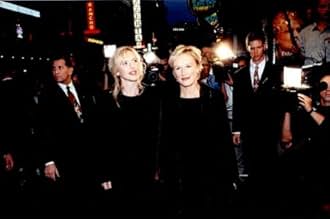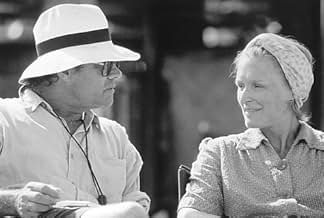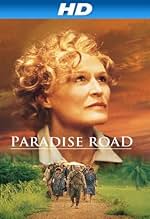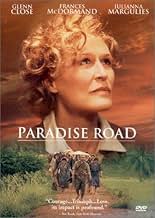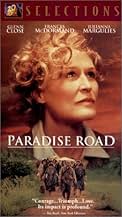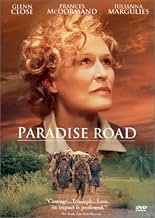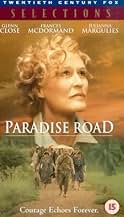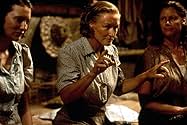VALUTAZIONE IMDb
6,8/10
6181
LA TUA VALUTAZIONE
Un gruppo di donne imprigionate sull'isola di Sumatra dai giapponesi durante la seconda guerra mondiale usano la musica per alleviare la loro miseria.Un gruppo di donne imprigionate sull'isola di Sumatra dai giapponesi durante la seconda guerra mondiale usano la musica per alleviare la loro miseria.Un gruppo di donne imprigionate sull'isola di Sumatra dai giapponesi durante la seconda guerra mondiale usano la musica per alleviare la loro miseria.
- Regia
- Sceneggiatura
- Star
- Premi
- 1 vittoria e 7 candidature totali
Johanna ter Steege
- Sister Wilhelminia
- (as Johanna Ter Steege)
Recensioni in evidenza
I found this a very moving film about a group of fairly ordinary people placed in extraordinary conditions. I found myself quite involved with all the acting and the story line. Here is a film filled with outstanding and understated performances about people's ideals and courage being tested.
As to this story having been told in 2 or 3 other movies, I find that to be an incredible comment. I didn't see anyone saying that there had already been about 100 movies about men fighting in World War II when "Saving Private Ryan" came out. It is time that the stories of these extraordinary women be told. Soldiers aren't the only ones to suffer and die in wars.
As to this story having been told in 2 or 3 other movies, I find that to be an incredible comment. I didn't see anyone saying that there had already been about 100 movies about men fighting in World War II when "Saving Private Ryan" came out. It is time that the stories of these extraordinary women be told. Soldiers aren't the only ones to suffer and die in wars.
'Paradise Road' is not the first time the story of European and Australian prisoners of the Japanese during WW2 has been told - there is a famous old movie of Neville Shute's 'A Town Like Alice' and the BBC's wonderful tv series, 'Tenko', from the early 1980s. Nevertheless there is certainly scope for this film, which tells the story of a group of largely upper class women who have to come to terms with captivity and brutality as a 'defeated race' and somehow survive the war. The particular twist to this film is the fact-based story of the choir a group of women started in one camp. In other ways, however, the story is practically identical to 'Tenko', only crammed into around 2 hours instead of 30. This means that the effect is very much like watching one of those Reduced Shakespeare Company shows that do the Complete Works of Shakespeare in one performance. Virtually nothing happens in Paradise Road that doesn't happen in Tenko - fair enough, since it is fact based, but you feel like you're watching whole episodes crammed into a single line and you find yourself desperate for more character development - you never find out, for example, who Glenn Close's character really _is_. Despite this, the acting is top-hole and the script-writing is quite sparky, while production values are for the most part extremely high - this is a very good looking film. And therein lies a problem. While the violence is not sanitised, the starvation is. The women in this film appear to have suffered no more ill effects after 3 years of captivity and hard labour than a healthy sun tan and fetching urchin-style crop. The fight-in-the-shower scene shows us an array of perfect bodies with no sores, sunburn, bruises, skin diseases etc. (Again, Tenko did this much better.) When some of the women are meant to be dying of starvation towards the end the idea that these healthy women are meant to be suffering is so laughable as to be more like amateur dramatics than professional movie making. In failing to give a sense of the struggle to survive that the real women went through, this film diminishes their courage and does not do them justice.
This film is watchable, however, and tells stories that need to be told. Watch it by all means - but 'Tenko' is now out on video, so get that next!
This film is watchable, however, and tells stories that need to be told. Watch it by all means - but 'Tenko' is now out on video, so get that next!
This film gripped me from the opening scene in the hotel ballroom and prooved to be a class act right to the end. Director Bruce Beresford's track record includes Driving Miss Daisy, Tender Mercies and Breaker Morant, so Paradise Road came as a special treat, not realising at the time of viewing that he had directed these films. The realistic scenes of violence had a tremendous impact in contrast to some of the wonderful underplaying of the leading actresses, notably Glenn Close and Pauline Collins. The Japanese actors, although unknown to me were chillingly effective. I can only hope for more films of this calibre but alas they are few and far between.
Paradise Road is based on the true story of women POWs in Sumatra during WWII. The film, for the most part, follows what really happened... with one glaring exception!
The incident that is prominently missing from Paradise Road is the Bangka Island massacre, which was one of the worst atrocities committed against women POWs during WWII and is an integral part of this story.
After their ship, The SS Vyner Brooke, was sunk, the survivors made for the nearest land which was Bangka Island. They came to shore in different places but a group of more than a hundred people ended up on Radji beach. The group consisted of 22 Australian Army nurses, some civilian men, women and children, and 30 British soldiers from another ship which had been sunk. The island was fully occupied by the Japanese and the group unanimously decided to give themselves up. The group leader set off to find someone to surrender to. The civilian women and children began walking towards the main town on the island. The 22 nurses remained behind with the men and the soldiers (many of whom were badly wounded), an elderly British woman also remained with her wounded husband.
When the group leader returned with a group of 20 Japanese, they ignored all requests for surrender. The Japanese shot and bayoneted the men, then ordered the 23 women to walk into the ocean. When they reached waist depth, the Japanese open fired with a machine gun and mowed the women down.
There was one survivor. One of the nurses, Vivian Bullwinkel, was shot through the side and survived by pretending to be dead. She hid in the jungle for 12 days, caring for a British soldier who had been bayoneted and left for dead (he later died). Eventually, she gave herself up and was re-united with the rest of the women in the prison camp in Muntok. When she told them what had happened on the beach and they quickly realised that they would all be killed if the Japanese learned there was a witness to the massacre. So they made a pact not to speak of it again until they were free.
Paradise Road is a fictional film based loosely on fact, not a documentary. Sometimes it is necessary to make changes to the real sequence of events in order for the film's structure and pacing to work. I do accept this and I would prefer to see a good film rather than a accurate one.
But in leaving out the massacre on the beach, the film does a disservice to these women. These women were aware, from the start of their internment, that the Japanese were capable of atrocities on a massive scale and that there was no safety in numbers. They lived in a constant state of fear that the Japanese would repeat such an act or learn that Vivian Bullwinkel had survived the massacre and kill them all.
Paradise Road tries to portray Japanese atrocities with a fictitious incident where a woman is set on fire (which did not really happen) but this does not compare to the scale of the 80 people massacred on Radji beach and the effect it had on the women in the camp. There were 32 Australian Army nurses in the camp and the women who died on the beach were their friends and colleagues. They were from the same unit and had nursed together for the first two years of the war. All their interactions with the Japanese guards were coloured by the knowledge that they had murdered 22 of their friends in cold blood.
Paradise Road is a very good movie and I suspect it will become the definitive film about female POWs during WWII. Which sadly means that the 22 women who were murdered on Radji beach will be lost from memory... and they deserve better than that.
If you want to learn more about the women POWs of Sumatra, I suggest you read "White Coolies: Australian Nurses Behind Enemy Lines," the diary kept by camp survivor Betty Jeffrey, or read the biography "Bullwinkel" by Norman G. Manners. There is also an excellent 1985 documentary called "Song of Survival", and a really tacky episode of "Willesee's Australians" that dramatises the story of Vivian Bullwinkel.
The incident that is prominently missing from Paradise Road is the Bangka Island massacre, which was one of the worst atrocities committed against women POWs during WWII and is an integral part of this story.
After their ship, The SS Vyner Brooke, was sunk, the survivors made for the nearest land which was Bangka Island. They came to shore in different places but a group of more than a hundred people ended up on Radji beach. The group consisted of 22 Australian Army nurses, some civilian men, women and children, and 30 British soldiers from another ship which had been sunk. The island was fully occupied by the Japanese and the group unanimously decided to give themselves up. The group leader set off to find someone to surrender to. The civilian women and children began walking towards the main town on the island. The 22 nurses remained behind with the men and the soldiers (many of whom were badly wounded), an elderly British woman also remained with her wounded husband.
When the group leader returned with a group of 20 Japanese, they ignored all requests for surrender. The Japanese shot and bayoneted the men, then ordered the 23 women to walk into the ocean. When they reached waist depth, the Japanese open fired with a machine gun and mowed the women down.
There was one survivor. One of the nurses, Vivian Bullwinkel, was shot through the side and survived by pretending to be dead. She hid in the jungle for 12 days, caring for a British soldier who had been bayoneted and left for dead (he later died). Eventually, she gave herself up and was re-united with the rest of the women in the prison camp in Muntok. When she told them what had happened on the beach and they quickly realised that they would all be killed if the Japanese learned there was a witness to the massacre. So they made a pact not to speak of it again until they were free.
Paradise Road is a fictional film based loosely on fact, not a documentary. Sometimes it is necessary to make changes to the real sequence of events in order for the film's structure and pacing to work. I do accept this and I would prefer to see a good film rather than a accurate one.
But in leaving out the massacre on the beach, the film does a disservice to these women. These women were aware, from the start of their internment, that the Japanese were capable of atrocities on a massive scale and that there was no safety in numbers. They lived in a constant state of fear that the Japanese would repeat such an act or learn that Vivian Bullwinkel had survived the massacre and kill them all.
Paradise Road tries to portray Japanese atrocities with a fictitious incident where a woman is set on fire (which did not really happen) but this does not compare to the scale of the 80 people massacred on Radji beach and the effect it had on the women in the camp. There were 32 Australian Army nurses in the camp and the women who died on the beach were their friends and colleagues. They were from the same unit and had nursed together for the first two years of the war. All their interactions with the Japanese guards were coloured by the knowledge that they had murdered 22 of their friends in cold blood.
Paradise Road is a very good movie and I suspect it will become the definitive film about female POWs during WWII. Which sadly means that the 22 women who were murdered on Radji beach will be lost from memory... and they deserve better than that.
If you want to learn more about the women POWs of Sumatra, I suggest you read "White Coolies: Australian Nurses Behind Enemy Lines," the diary kept by camp survivor Betty Jeffrey, or read the biography "Bullwinkel" by Norman G. Manners. There is also an excellent 1985 documentary called "Song of Survival", and a really tacky episode of "Willesee's Australians" that dramatises the story of Vivian Bullwinkel.
10srne
I stumbled across this movie surfing TV channels late one night. I was drawn right into the plot, and thought it was an incredible story, incredibly well-told. It's a true story, which I previously did not know anything about, but should have. Both the story, itself, and the film, should be much, much better known. It is also one of Glenn Close's best performances. Her performance, and the film, itself, are absoultely gripping! If you like true-life stories that are extremely well-done, such as "We Were Soldiers," then this one is of a similar genre, but with the main characters being women.
Lo sapevi?
- QuizThe music in the film was derived from the actual score transcripts used in the P.O.W camps which survived World War II.
- BlooperThe women of the choir did the singing while sitting down because of having to work in the extreme heat during the day left them exhausted.
- Citazioni
Adrienne Pargiter: You don't hate them do you?
Margaret Drummond: No.
Adrienne Pargiter: Why not?
Margaret Drummond: I've tried, but I can't bring myself to hate people. The worse they behave, the sorrier I feel for them.
- Colonne sonoreSymphony No. 9 in E minor Op. 95 'From the New World' II. Largo
Written by Antonín Dvorák (as Antonin Dvorak)
I più visti
Accedi per valutare e creare un elenco di titoli salvati per ottenere consigli personalizzati
- How long is Paradise Road?Powered by Alexa
Dettagli
- Data di uscita
- Paesi di origine
- Lingue
- Celebre anche come
- Дорога в рай
- Luoghi delle riprese
- Aziende produttrici
- Vedi altri crediti dell’azienda su IMDbPro
Botteghino
- Budget
- 16.000.000 USD (previsto)
- Lordo Stati Uniti e Canada
- 2.007.100 USD
- Fine settimana di apertura Stati Uniti e Canada
- 62.518 USD
- 13 apr 1997
- Lordo in tutto il mondo
- 2.007.100 USD
- Tempo di esecuzione
- 2h 2min(122 min)
- Colore
- Mix di suoni
- Proporzioni
- 2.35 : 1
Contribuisci a questa pagina
Suggerisci una modifica o aggiungi i contenuti mancanti


